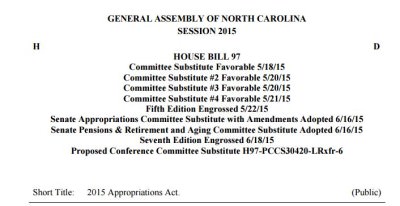Last week, the North Carolina legislature passed and Governor McCrory signed a bill that sends a clear message to LGBTQ kids in our state, and the message is this: you are not worthy of our love and support and even basic legal protections. This is a message that these children have heard from bullies their entire lives and now our lawmakers have made it the official policy of our state.
The public justification for House Bill 2 was to overturn a Charlotte ordinance that, among other discrimination protections, allowed transgender people to use restrooms that correspond with their gender identity. Legislators argued that the law was needed to protect women and girls from biological men from entering the ladies room.
There is no data to support this concern. Over 200 cities across the country have ordinances similar to Charlotte’s and there have not been any reported problems. In fact, anyone with malicious intent entering a bathroom would have been prosecuted regardless of this law.
A closer look at the data actually indicates that transgender kids are the ones in need of protection.
- 50 percent of transgender people have experienced sexual violence and bathrooms are one of the most likely places for transgender people to be physically or verbally assaulted.
- A national survey conducted by the Gay, Lesbian, and Straight Education Network (GLSEN) found that 75 percent of transgender students feel unsafe at school and 59 percent of trans students have been denied access to restrooms consistent with their gender identity.
- 41 percent of transgender people have attempted suicide compared to just 4.6 percent of the rest of the population, according to a study by the American Foundation for Suicide Prevention.
In a recent presentation to the North Carolina Child Fatality Task Force, Dr. David Goldston of Duke University Medical School outlined the risk factors associated with youth suicide. Among them are a variety of factors related to how parents, peers, and society as a whole respond to LGBTQ youth, including bullying, social isolation, and parental rejection.
Given these risk factors, it’s sad, but not surprising, that LGBTQ youth are more likely to attempt suicide than other young people. Adolescence is already a time of tremendous transition. Grappling with sexual identity and gender identity adds to the insecurity and isolation many youth feel, because they often have to deal with the harmful reactions of their families, peers, teachers, and others in the community.
I spoke with a friend of mine whose child is gender non-conforming about what this new law means to her. Here’s what she said:
“My child has been hospitalized several times for suicidal ideation or talking about self-harm. His gender identity isn’t the issue; it’s how he’s treated by others as a result. He’s been consistently sent the message that he is ‘less than’ and that there is something fundamentally wrong with him. It’s not just other kids, but teachers and even mental health professionals. And now our legislators. This is a kid who is kind, smart, funny—honestly one of my favorite people in the world to have a conversation with. It breaks my heart that some part of himself might believe that this type of bullying is justified.”
In addition to the bathroom-related provisions, House Bill 2 bans local governments from passing ordinances to protect LGBTQ people from employment discrimination. Since LGBTQ people are currently excluded from the statewide anti-discrimination statute, this means that it is totally legal to fire or not hire someone because of their sexual orientation or gender identity everywhere in North Carolina.
Once again, the message to LGBTQ children is clear: we don’t care if you end up being a scientist who cures cancer or an award-winning teacher—you don’t deserve the same protections all other children and citizens of this state are entitled to.
During the legislature’s one-day session to pass this bill, there was a brief opportunity for the public to testify before the Senate Judiciary II Committee. Skye Thompson, a brave 15-year-old transgender youth, said to a room full of powerful legislators: “I’ve dealt with bullying my whole life and now I worry that my own state lawmakers are bullying me as well. I feel bullied by you guys.”
Youth like Skye need our support, love, and protection, not reactionary laws that worsen the discrimination and bullying they already face. North Carolina, we are not this. We can do better.
Recommended reading



